Education for biodiversity conservation is in IPÊ's DNA, the organisation began offering short courses in this field back in 1996; soon becoming a reference in Conservation Biology. Today, ESCAS - Faculty for Environmental Conservation and Sustainability offers, in addition to short courses, a Professional Master's Degree and an MBA, all of which favour training and teaching around biodiversity in light of Brazil's socio-environmental challenges.
Graduates since 1996: 7,029
Graduates in 2019: 316
Master graduates: 141
MBA graduates: 53
Scholarships: 302
Classroom courses: 91
Online courses: 68
Total scholarships: 2

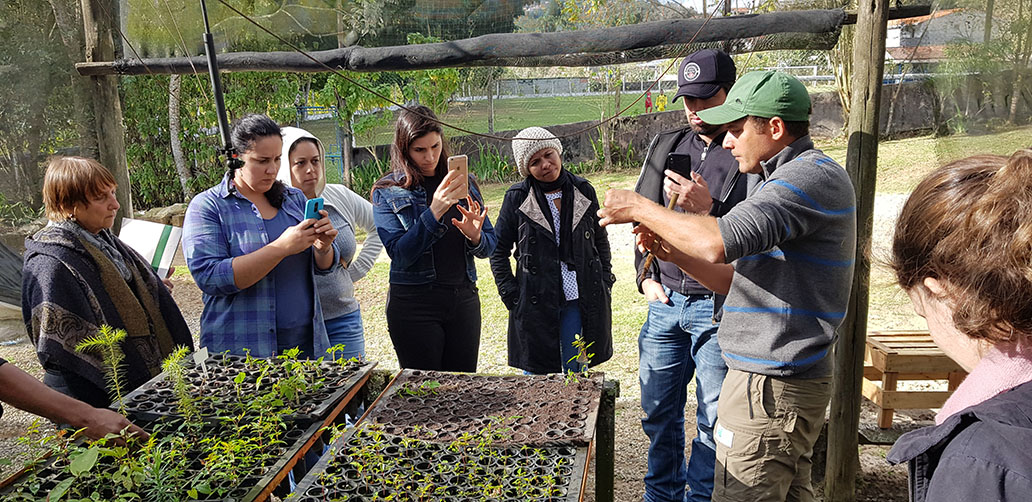 picture by: Arquivo IPÊ
picture by: Arquivo IPÊ
In 2019, ESCAS promoted field courses for Nurseries and Seedlings, Landscape Ecology and Field Taxonomy, with 44 people participating. The classes provide a practical approach and the necessary tools for those in the field. Some courses were also undertaken online, to ensure access to any professionals not in São Paulo. One of the longest courses at ESCAS, the Nursery and Seedlings course, changed direction towards being more market-oriented in 2019. Examples show that work in this field can be profitable mainly in areas of high environmental liability in which there's high demand for seedlings native to the area. Some nurseries produce 400,000 seedlings per year and are expanding their capacity to meet demand.
The Landscape Ecology course provides students with tools to help them deal with conservation in the face of complex changes to land and landscape use. Forest engineer Joachim Graf Neto said that, thanks to the course, his decision-making process on how to work with species was better, due to maps that indicate forest fragments, lakes and rivers along with agriculture and livestock area. Watch Joaquin's testimonial here.
ESCAS/IPÊ has been working to develop international partnerships with universities, as this gives foreign students the opportunity to get to know how IPÊ operates and, for ESCAS students, the chance to get in touch with courses promoted by organizations abroad.
Total Students: 128
Partner Universities: University of Colorado (USA), ELTI (Yale University Initiative)
and the University of St. Gallen (Switzerland).
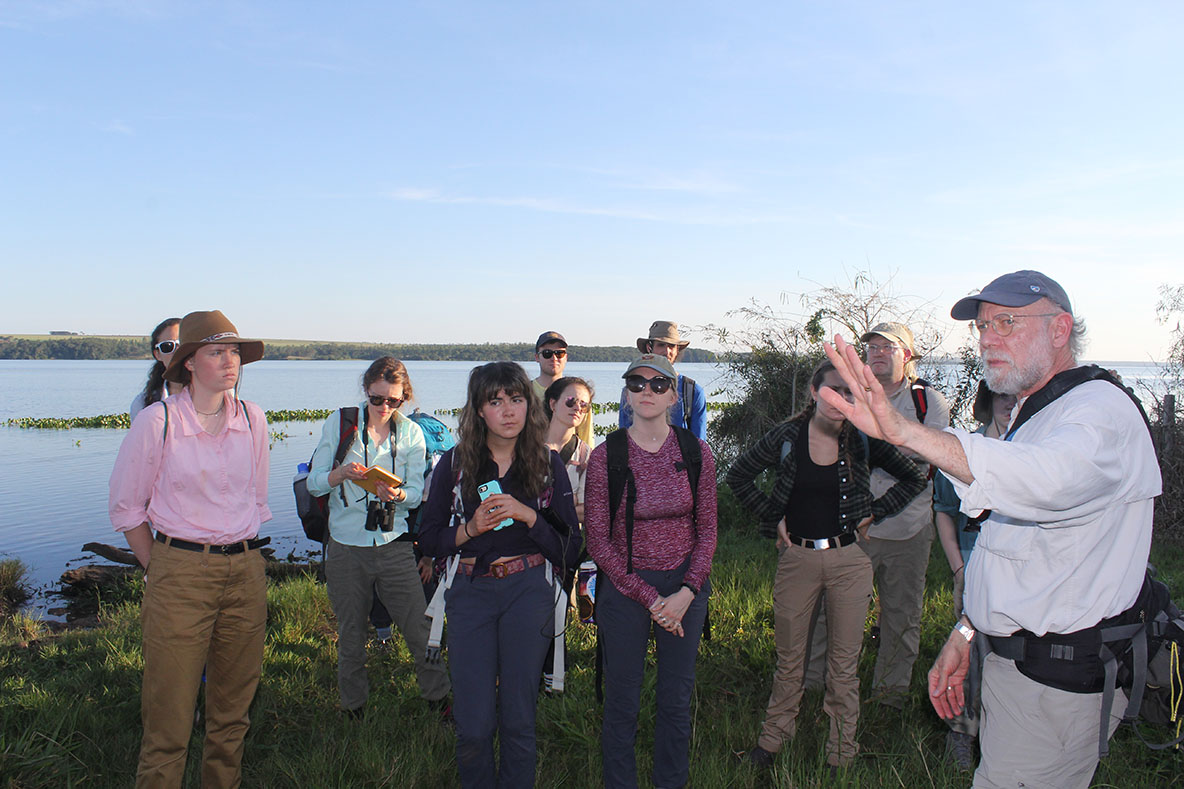 picture by: Arquivo IPÊ
picture by: Arquivo IPÊ
For the ninth time we held the course for Conservation Biology and Practice in Brazil's Atlantic Forest - Brazil Global Seminar with the University of Colorado Boulder (USA). From the 13th to the 30th of May, undergraduate students participated in an immersion program in Brazil, going through IPÊ projects and developing their own.
With the University of St Gallen, Switzerland, we held the second edition of practical field classes in the Amazon. Having embarked on the Maíra I; IPÊ's boat, the students visited projects in the lower Rio Negro (Amazon). Business and economics students got a taste of daily life in the region and applied their knowledge to bona fide projects.
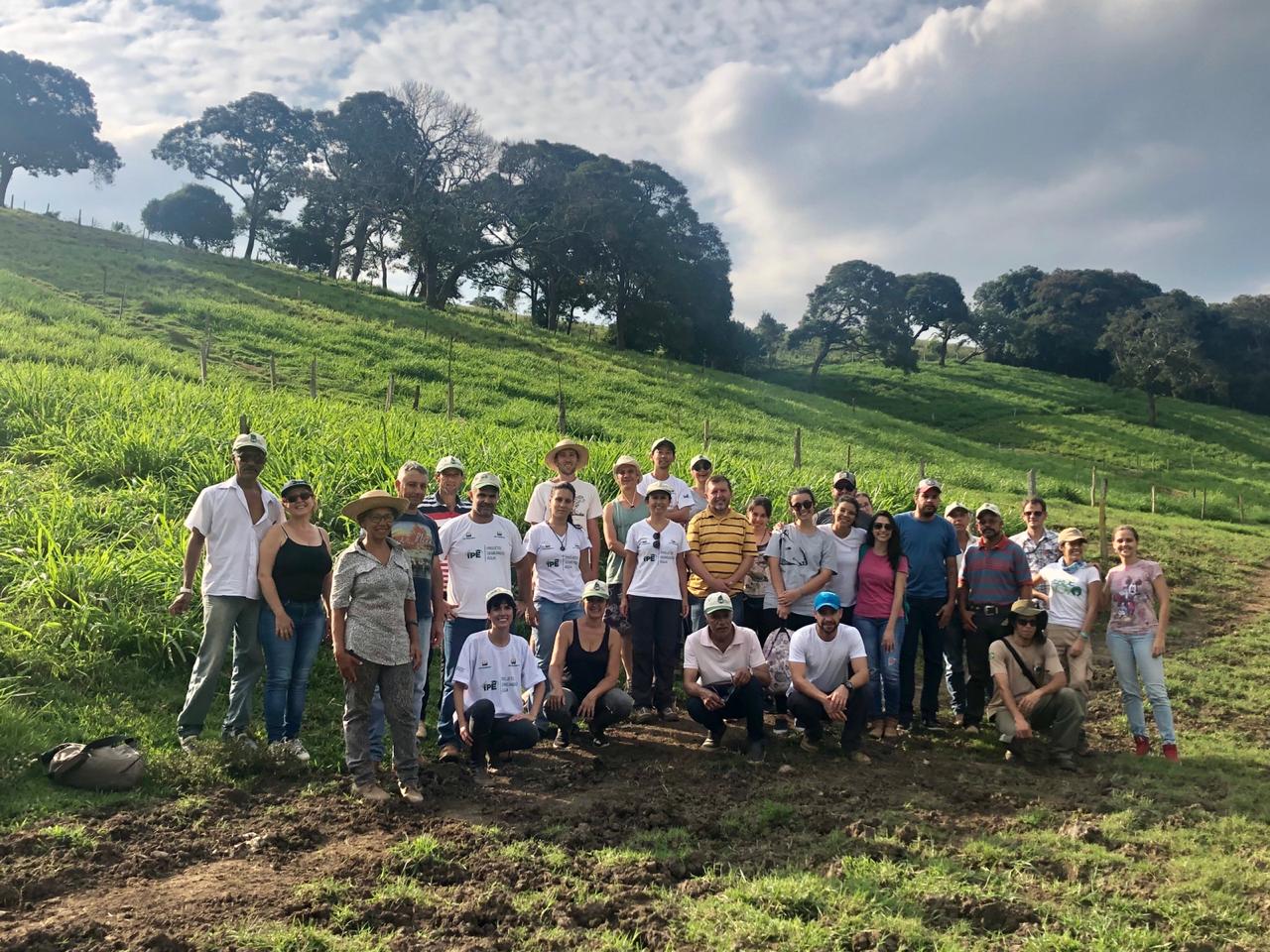 picture by: Arquivo IPÊ
picture by: Arquivo IPÊ
In partnership with ELTI - Environmental Leadership and Training Initiative, an initiative at Yale University's School of Forestry and Environmental Studies, we hosted two free courses for 36 farmers. The courses worked in tandem with the Semeando Água project which is centered on the conservation of the Sistema Cantareira.
Held in Itapeva (SP), Camanducaia (MG) and Extrema (MG), the focus of the classes was to provide training in sustainable production and forest restoration, tackling practices such as Rural Management, Chain of Production, Pasture Management, Agroforestry and Forest Restoration.
The course was also held with those who work in the field of restoration in mind: "dynamic management for monitoring forest restoration". The partnership between ELTI, UNEP Brazil and Instituto Terra culminated in six weeks of online clases then one week in-class at Bulcão Farm, Aimorés (MG). Overall, 19 professionals participated, all with different backgrounds and specialising in different fields, some from the government, others NGO's and companies.

In 2019, we continued supporting our ex alumni with the ELTI Leadership Program. The initiative provides both technical assistance and assistance in the implementation of sustainable production systems for those who've attended prior courses. One of the program's objectives was rural planning training for former students. This would allow students to continue supporting producers in the Cadastro Ambiental Rural (CAR) and in planning reforestation in areas of production systems. The program was attended by 29 landowners and extension workers.

In partnership with ELTI once again, ESCAS started taking regional action by training rural producers and extension workers in partnership with Danone and the Colombian organisation Centro de Pesquisa em Sistemas de Produção Agrícola Sustentável (CIPAV).
The idea is to create small to medium sized demonstration units (DU's) for sustainable dairy farming, while applying practical knowledge to see the real-world benefits of the model. In 2019, the first pilot unit began at Fazenda Gordura (MG). The work is still ongoing in 2020.
The multidisciplinary Professional Master's program in Biodiversity Conservation and Sustainable Development encourages healthy interaction between student and teacher. As well as that, the end-of-course projects effectively contributed to society and the environment: with 66% of students reporting that their master's degree project was applied in an socio-environmental initiative.
Students in 2019: 58
Master's graduates in 2019: 28
Total Master's graduates: 141
By 2019, 141 students graduated with a master's, 40% of which obtained professional placements thanks to the program. ESCAS' Master's graduates work in a variety of sectors: 31% in companies, 21% in civil society organizations, 45% in governmental agencies and 3% in academia.

In 2019, 26 journal articles were published by professors and students, and about 40 technical papers were produced by the program and submitted to CAPES (Coordenação de Aperfeiçoamento de Pessoal de Nível Superior). The course's results ensured that ESCAS' Professional Master's Degree received a score of 4 in CAPES' evaluation (the highest possible score being 5). The grade means that IPÊ's school is now looking to the future and its newest chapter, doctorates and PHD's.
ESCAS' Professional Master's degree is now two classes large. In the South of Bahia and with support from Veracel and Instituto Arapyaú, the course offers scholarships to professionals from the area. In Nazaré Paulista (SP) there is also the opportunity to receive a partial or full scholarship.

By looking at practical side of study, the master's degree students are inspired further. In the final stages of the professional master's program, students work on a real challenge which requires developing solutions for socio-environmental problems that are then delivered to the client.
In 2019, our students coordinate a Management Plan for the Copaíba Private Natural Heritage Reserve (RPPN) in Socorro (SP). Copaíba is an environmental association whose mission is "to conserve and restore the Atlantic Forest in the Peixe and Camanducaia river basins".
This management plan goes into detail explaining the geomorphology and water resources of the RPPN, in addition to pointing out the diversity of its flora and fauna, the social dynamics of the territory, as well as the main economic activity and services in the area.
In previous years other such plans were devised as part of the course: Solid Waste Management Plan for the city of Nazaré Paulista; Survey of the impact of cell phone antennas for the company Vivo; Research on the consumer disposal for reverse logistics for Havaianas / Alpargatas S.A.; Communication Plan for the Serra do Conduru (BA) State Park; Study on future prospects for high school students in Serra Grande (BA).
"The interdisciplinary nature of the group forces you to think outside the box - Which is what working in the real world is actually like. Now I'm a biologist that knows how to talk to people, how to tell a story, and above all, how to listen to people, to communities. It also changed my outlook on research, even with the field team, listening to them more, learning together. It really opened a door in work and out of it"
Francis Forero Sánchez, biologist, Colombian, master's student at ESCAS. He is the recipient of a scholarship from WCN and WWF.
We want our impact to be felt far and wide. So, to reach a greater number of students benefited in Sustainability and Biodiversity Conservation courses of various levels, we created a Scholarship Fund that can be supported by you via a donation through the Global Giving
Be part of it!
Want to know more? Click here

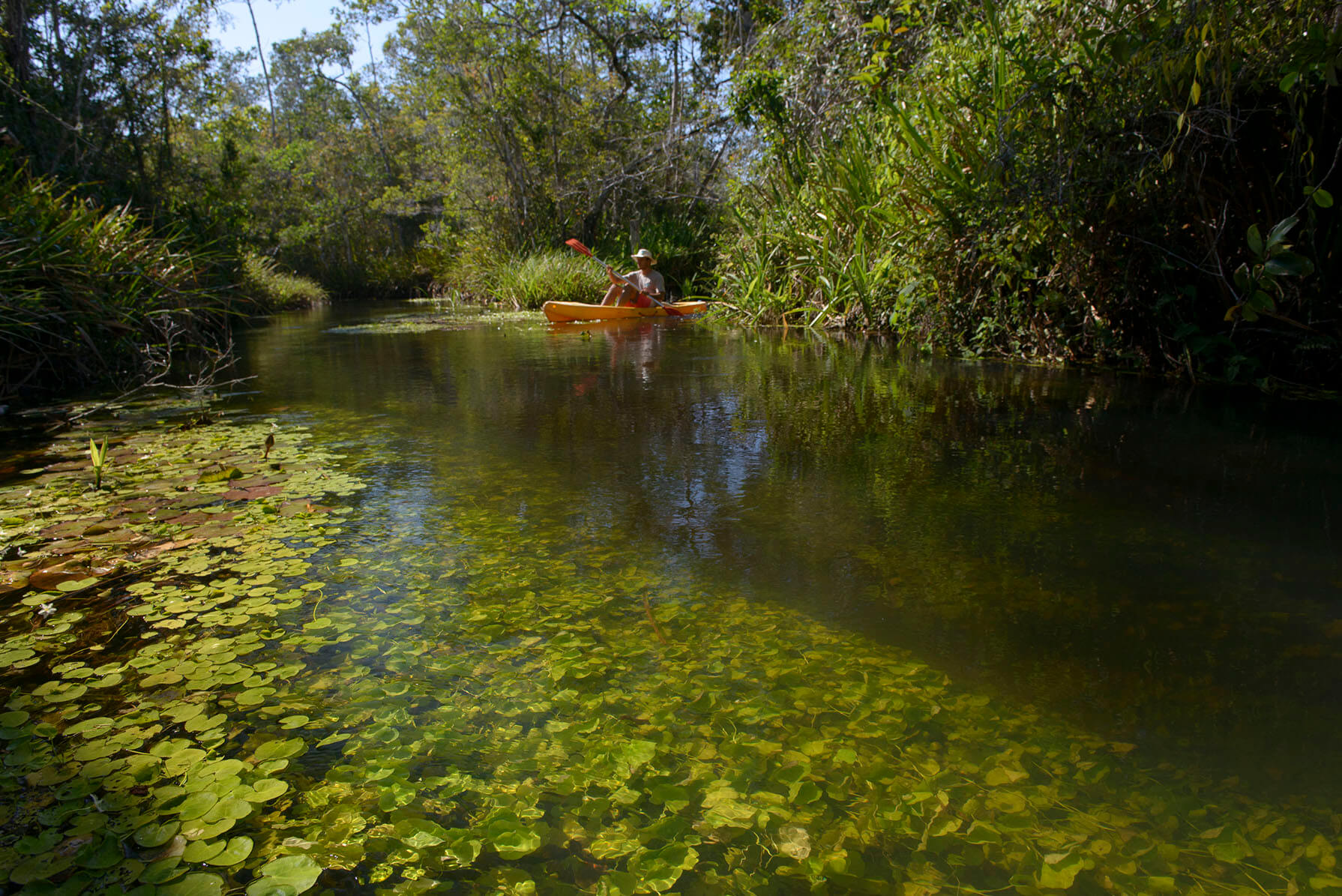 picture by: Arquivo Pessoal
picture by: Arquivo Pessoal
The Professional Master's is now in Porto Seguro (BA) too. Upon the graduation of six cohorts of students in the city of Uruçuca (Serra Grande), where the course has been held since 2009 in continuous partnership with Instituto Arapyaú, the students of the seventh cohort (2019) now also have classes in the Estação Veracel Private Reserve of Natural Heritage (RPPN), in partnership with this company.
The group includes biology consultants, architects, managers of public and private conservation units, social entrepreneurs, agronomists and forest engineers working in restoration and agroecology. All of which are interested in learning how to act to support the sustainability of their territories and in the conservation of socio-biodiversity.
The Professional Master's Degree has 67 graduates in Bahia. In the south of Bahia, ESCAS provided all students with full scholarships, ensuring quality training for the professionals who today really make the difference in the region
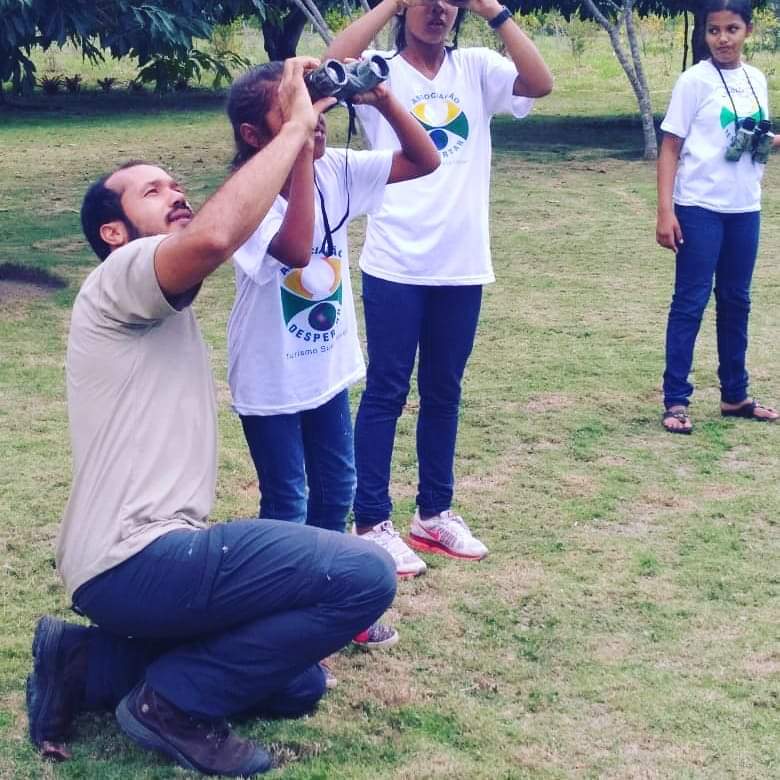 picture by: Arquivo Pessoal
picture by: Arquivo Pessoal
"Having the option of doing a master's in Bahia gave me the chance I needed, I couldn't do a course like this if it wasn't here. It's been crucial in coming to understand how what happens in Brazil and around the world impacts the region. Not to mention how much we've learned about conflict resolution and how to develop the implementation of conservation units like RPPNs". Cleiuodson Lage, nicknamed Peu, forest engineer at RPPN Rio do Brasil. .
The MBA prepares students in developing solutions for the complex socio-environmental challenges in Brazil and around the world. The course has teachers with extensive experience in the industry and is structured in Blended Learning, meaning modules are divided between online and in-class. For the MBA we have pedagogical support from Artemisia Negócios Sociais and Ceats-USP (Center for Entrepreneurship and Administration in the Third Sector). Professors from USP (University of São Paulo), IPÊ, FGV (Fundação Getulio Vargas), UFRJ (Federal University of Rio de Janeiro) and Artemisia come together as the teaching staff.
The main topics are approached via case studies, which encourages participants to develop practical solutions to real social and environmental challenges. There are also technical visits aimed at promoting interaction with projects from various institutions working in the industry. One of which is an immersion experience on the IPÊ school-boat Maíra I in the Amazon.

The MBA's fifth group started in October 2019 and is made up of 15 students from different backgrounds, who are looking for some new career direction and to enable themselves to create innovative businesses that positively impact society and the environment.
Biologist Naiara Rabelo Valle is president of the Ecos de Gaia Institute, which works with social and environmental projects in the state of Maranhão, such as fauna monitoring and restoration. Amongst other initiatives, she wants to promote the recovery of 20 springs in the state with partnership from private enterprise. Naiara says that, thanks to the course, her ability to negotiate in the corporate world has took a positive leap forward.
“What I wanted to get out of the MBA was to get to know the other side of companies. Today I see how our discourse with managers and entrepreneurs has improved, showing that it's possible to keep one eye on the socio-environmental, while still generating income for the business". Naiara Rabelo Valle, President of Instituto Ecos de Gaia and MBA student in Socio-Environmental Business Management